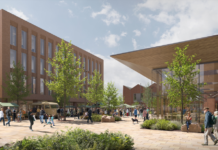Groups of blind and partially sighted (BPS) people in the North West – including Merseyside, Greater Manchester and Lancashire – are encouraging residents to cut back their foliage to increase their independence.
Sight Loss Councils (SLCs), funded by Thomas Pocklington Trust (TPT), are regional groups led by blind and partially sighted volunteers. Together, they tackle local issues, and work with organisations to ensure what they do is accessible and inclusive.
SLC volunteer members in several regions across England are spearheading this campaign because 75 per cent of blind and partially sighted people reported that ‘Overhanging branches, overgrown hedges and vegetation are a real deterrent to people and a cause of accidents’ (Listening Month, 2022).
This is because many blind and partially sighted people are forced to walk onto the road and risk injury whilst navigating the streets due to overgrown hedges, bushes and foliage. This impacts their confidence, independence, and the ability to make safe journeys to live full and independent lives.
To deliver their campaign, Sight Loss Council volunteers have produced a series of short videos highlighting the issue. They have also produced online guidance and resources, including around the best times of the year to cut foliage back and how to avoid an impact on local wildlife. They are also raising awareness in local media.
Many blind and partially sighted individuals have reported to Sight Loss Councils that they have been hurt, injured, and had their path blocked by overgrown bushes, overhanging branches and foliage. This can reduce people’s confidence to travel independently and safely, and discourage people from going out.
Local authorities are also legally obliged to act on reports of overgrown foliage so people can navigate our streets and are safe from injury, and guidance has been developed by Thomas Pocklington Trust to support them to do this.
Kelly Barton, Thomas Pocklington Trust’s Engagement Manager for the North West, is a local resident from Southport in Merseyside and registered blind. She shared her own experience of overhanging vegetation in the local area.
She said: “We are encouraging everyone to help keep our streets clear and cut it back. Local residents can also report problem overhanging vegetation and foliage to their local authority. Under the Highways Act 1980, local authorities can require landowners to cut back overhanging branches and vegetation if it endangers or obstructs the passage of pedestrians.
“At this time of year particularly, it become really challenging. I use a long cane to get about but obviously this doesn’t detect overhanging branches above my head. It’s not pleasant at all to be hit in the face when you’re not expecting it.
“Down the road where I live a few houses have been particularly overgrown and coming right onto the path. I have had to knock on their door and ask if they can cut overhanging bushes back. Most people are obliging but you never know what reaction you’re going to get.
“My mum and dad live nearby and if my dad notices any overhanging branches on the routes that he knows I walk, he knocks on the owner’s door and offers to cut it back for them and clears any cuttings away. He shouldn’t have to do this, but he knows how unpleasant it is for me to be scratched in the face by a branch.”
“Sight Loss Councils hope everyone will help us to raise awareness of this issue and encourage everyone to cut it back.”
Get involved in the cut it back campaign. Learn more at www.sightlosscouncils.org.uk/







